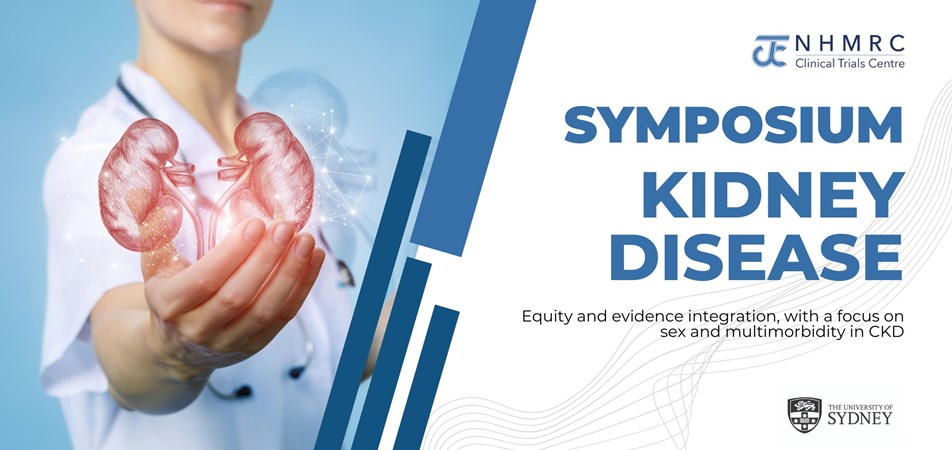To recover your password please fill in your email address
Please fill in below form to create an account with us

 Equity & Evidence Integration in Kidney Disease with a focus on sex and muitimorbidity
Equity & Evidence Integration in Kidney Disease with a focus on sex and muitimorbidity
When: Friday 24th Feb | 1:00 – 5:00 PM
Where: Hybrid event – attend virtually or in person (The Auditorium, Ground Floor, Medical Foundation Building, Camperdown, Sydney)
View the recording below

This event will review the important area of equity and evidence integration in kidney disease with a focus on sex and multimorbidity. We will be joined by distinguished international speakers from the University of Glasgow, supported by a Partnership Collaboration Award.
The content is aimed at clinicians involved in the care of people with kidney disease, cardiovascular disease, and other non-communicable diseases as well as health services, clinical and public health researchers, and those with an interest in big data, biobanking, and research methodology.
PRESENTATIONS
All hail kale! Trials of vitamin K in chronic kidney disease, Professor Patrick (Paddy) Mark
Patients with chronic kidney disease (CKD) are at a greatly increased risk of premature cardiovascular disease. Vascular calcification is present in excess and appears to be associated with risk. Vitamin K, present in leafy vegetables, is required for metabolic pathways involved in the inhibition of arterial calcification. Therefore, vitamin K supplementations may be a useful strategy for inhibiting vascular calcification to target reduction in cardiovascular risk in CKD.
The impact of age, sex, comorbidity count and race/ethnicity on attrition and screen failure from trials, Dr Jennifer Lees
Presenting data from meta-analyses of individual participant-level data from phase 3/4 industry-funded clinical trials, this presentation will describe the representation of underserved populations in trials and demonstrate how participant characteristics are associated with trial entry and completion.
Sex differences in mortality and kidney waitlist: Population-based study in Australia and New Zealand, Dr Nicole De La Mata
Systematic differences in care for kidney failure might mean that women with kidney failure have comparatively poorer survival rates compared with men. These sex differences may also prevail on the kidney waitlist where women may be delisted more often or take longer to return to the waitlist.
Outcomes in chronic kidney disease: the interplay between sex and multimorbidity, Dr Michael Sullivan
People with chronic kidney disease are at increased risk of various outcomes such as cardiovascular events and emergency admissions to hospital. Dr Sullivan will explore how these risks vary depending on sex and what co-morbidities exist alongside kidney disease.
Tackling chronic kidney disease burden in low income setting Nepal
CKD burden in low- and middle-income countries remains nearly four times higher than those observed in developed countries. Furthermore, uncontrolled hypertension and diabetes are of great concern, and variably affect CKD progression. This is of particular concern as nearly 90% of hypertension and 75% of cases are uncontrolled in these settings. Against this backdrop, this talk will explore the epidemiology, prevention, and management of CKD in a low resource setting, with reference to Nepal.
DISTINGUISHED INTERNATIONAL SPEAKERS
Prof Patrick (Paddy) Mark
Professor Paddy Mark is a Professor of Nephrology and Honorary Consultant Nephrologist at the Glasgow Renal and Transplant Unit based at the Queen Elizabeth University Hospital Glasgow. He leads a number of clinical trials in nephrology. His work has been funded by Kidney Research UK, MRC, NIHR and the British Heart Foundation.
Dr Michael Sullivan
Dr Michael Sullivan is a clinical nephrology trainee at the Queen Elizabeth University Hospital, Glasgow, UK. He is a clinical lecturer at the School of Cardiovascular and Metabolic Health at the University of Glasgow.
His research focuses on chronic kidney disease, using data science techniques to study monitoring, treatment and outcomes. He has specific interests in improving the treatment of people with multiple health conditions and people from disadvantaged groups. He has used techniques like clustering to improve the understanding of chronic kidney disease in these populations.
Dr Jennifer Lees
Dr Jennifer Lees is a Senior Clinical Research Fellow and Honorary Consultant in Renal Medicine at the University of Glasgow. Her research background is in clinical trials, epidemiology and data science. Her research interest is in exploring strategies to mitigate the long-term risks associated with chronic kidney disease, particularly cardiovascular disease and cancer. She has a particular interest in the use of cystatin C to risk-stratify patients with chronic kidney disease. In 2022, she won two prestigious young investigator awards: the UK Kidney Association “Raine Award” and the European Renal Association’s inaugural “Eberhard Ritz Award” for Clinical Science.
UNIVERSITY OF SYDNEY CONTRIBUTORS
Professor Angela Webster is an NHMRC Leadership Fellow. She is a Clinical Epidemiologist, Nephrologist and Transplant Physician, having trained in England, Scotland and Australia. Angela splits her time working as Director of Evidence Integration at the NHMRC Clinical Trials Centre (CTC), Professor in Clinical Epidemiology in the School of Public Health, and as a Senior Staff Specialist in renal medicine and transplantation at Westmead Hospital.
Dr Shiva Raj Mishra is a research fellow at the NHMRC Clinical Trials Centre at the University of Sydney. He is involved in designing meta-epidemiological studies looking at health equity, diversity and inclusion in clinical trials and exploring health disparities in cardiovascular outcomes and services.
Shiva has several years of training and experience in epidemiology and health data science. He collaborates in studies to improve understanding of health disparities, individual and population-level determinants of risk factors and public health interventions on cardiometabolic diseases with a focus on low-income setting.
Dr Nicole De La Mata is a mid-career biostatistician researcher and senior lecturer in biostatistics at the University of Sydney. Her expertise lies in establishing data linkage studies and using these to apply advanced statistical models to understand patient journeys and complex clinical scenarios. Her work has broadly aimed to improve health service quality and efficiency to translate into better and more equitable patient outcomes.
Please contact rebecca.blain@sydney.edu.au with any inquiries.